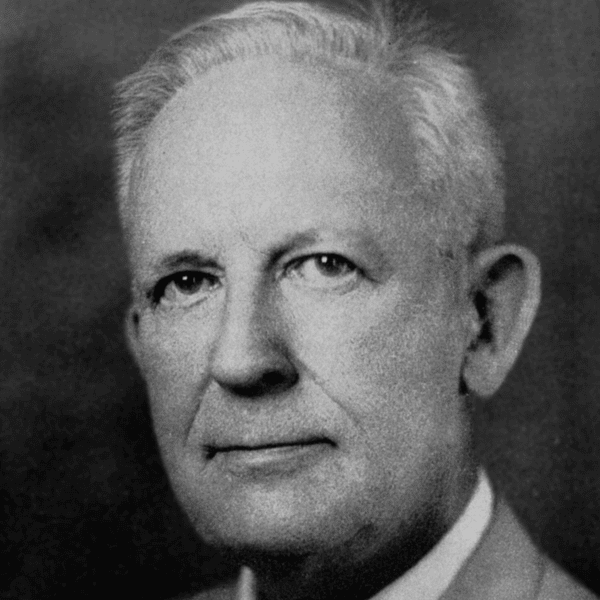Presidential Address
In Memoriam
From the American Historical Review 74:5 (June 1969)
Bernadotte E. Schmitt (May 19, 1886–March 23, 1969), president of the American Historical Association in 1960, died on March 22 in Alexandria, Virginia, at the age of eighty-two. Although he had been ill for some time and had suffered a stroke in 1968, Schmitt remained active almost to the day of his death, reviewing new monographs, revising his manuscript on the World War I period intended for The Rise of Modern Europe series, and taking a lively and productive interest in the affairs of the AHA.
Born in Strasburg, Virginia, Schmitt received his AB from the University of Tennessee in 1904 and his PhD from the University of Wisconsin in 1910. In the meantime, he was one of the first Rhodes scholars at Oxford, where he was a member of Merton College and took a first-class degree in modern history. After almost fifteen years at Western Reserve University, punctuated by wartime service in the US Army, he went to the University of Chicago in 1925. From 1939 until his “retirement” in 1946 to an active life of governmental service and further scholarship, he was Andrew MacLeish Distinguished Service Professor. As a demanding and imaginative first editor of the Journal of Modern History from 1929 until 1946, as editor in chief of the Documents on German Foreign Policy, 1918–1945, and as special adviser to the Historical Division of the US Department of State, he made important contributions to historical study and public policy. But it will be for the brilliance of his pioneering scholarship on the diplomacy of the years before World War I that Schmitt will be especially remembered. Despite its title, England and Germany, 1740–1914 (1916), his first book was mainly concerned with the decade before the war broke out. Its conclusion that Germany must bear a major share of responsibility for allowing the war to come was a position that he maintained throughout his career. That conclusion was impressively supported in Schmitt’s most important publication, the two-volume work entitled The Coming of The War: 1914. Published in 1930, it won for Schmitt the Pulitzer Prize as well as the George Louis Beer Prize of the American Historical Association. Yet his assessment of war guilt, already under vehement, and sometimes personal, assault by so extreme a controversialist as Harry Elmer Barnes, was also subjected to vigorous attack by the more temperate revisionists who followed the analysis developed hy scholars such as Sidney Bradshaw Fay. Accused of being “pro-British” and “anti-German,” Schmitt continued to make his argument in a series of important articles and books, of which perhaps the brief Triple Alliance and Triple Entente (1934) and The Annexation of Bosnia, 1908–1909 (1937), were the best known. He had the satisfaction, after the German documents were opened in the wake of World War II, of seeing the scholarly world acknowledge that his reading of the issue of responsibility had stood the test of time and of new evidence much better than the rather amorphous revisionism still embalmed in too many textbooks of modern European history.
At the University of Chicago students approached the rather austere and aloof Schmitt with some trepidation, only to discover that he was a shy and generous man who was very much interested in them and their work. As he grew older he mellowed well, and his marriage in 1939 to the wise and charming Damaris Ames accelerated the process. For at least one generation of students he became “Uncle Bernadotte,” a warm and affectionate mentor and adviser. Many of them in the 1950’s and the 1960’s treasured the visits to his home in Alexandria that were often the high points of research or business expeditions to Washington. In his later years Schmitt took great pleasure from the fact that three of his books, including his first, were selected for reprinting at about the same time. Deeply attached to Oxford, he journeyed to England with Mrs. Schmitt in 1967 to help celebrate the seven-hundredth anniversary of the founding of his beloved Merton College. The honorary DLitt that Oxford bestowed upon him at that time gratified him almost as much as the fact that he had been made an honorary Fellow of Merton in 1966. The historical profession as a whole will mark the passing of one of its most distinguished scholars. And many historians, young and old, will remember with satisfaction their good fortune in having known so genuine and loyal a friend.
Bibliography
The Balkan revolution, by Bernadotte E. Schmitt. Cleveland: Western Reserve University Press, 1914.
England and Germany, 1740–1914, by Bernadotte Everly Schmitt. Princeton: Princeton University Press, 1916.
An outline of modern European history, by Bernadotte E. Schmitt. 3d ed. Cleveland: Western Reserve University, 1923.
Triple alliance and triple entente, by Bernadotte E. Schmitt. New York: H. Holt, 1934.
From Versailles to Munich, 1918–1938, by Bernadotte E. Schmitt. Chicago: University of Chicago Press, 1938.
What shall we do with Germany? By Bernadotte E. Schmitt. Chicago: University of Chicago Press, 1943.
The origins of the First World War, by Bernadotte E. Schmitt. London: Published for the Historical Association by Routledge and Kegan Paul, 1958.
The fashion and future of history; historical studies and addresses. Cleveland: Press of Western Reserve University, 1960.
Some historians of modern Europe; essays in historiography, edited by Bernadotte E. Schmitt. Port Washington, N.Y.: Kennikat Press, 1966, 1942.
The annexation of Bosnia, 1908–1909. New York: H. Fertig, 1970.
The world in the crucible, 1914–1919, by Bernadotte E. Schmitt and Harold C. Vedeler. 1st ed. New York: Harper & Row, 1984.
